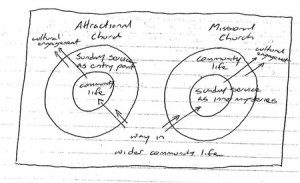Read Part 2 :: What is emergent? Centered set
While there seem to be countless folks in the Church who are more than happy to avoid being labeled emergent, the exact opposite seems to be true for the term missional. More and more folks are rushing to use the term to define their ministries. Some have even suggested it may soon take the place of evangelical in the near future.
And while emergents can be included in the ranks of those using the term it shouldn’t be assumed that those claiming to be missional should also be labeled as emergent. But from my experience it tends to be a strong piece within emerging Christianity — and something I’m working to understand and practice more fully in my daily life.
Like I originally noted about sharing my thoughts on emerging, this is not in the least an exhaustive explanation of the term missional. There are far better places to find that information than here. My hope is that this will serve as a basic primer and how it relates to the emerging conversation.
The term missional springs from Missio Dei, or the Mission of God. While historically many have seen only certain “called” members as those active in the Mission of God (either on the foreign mission field or as full time pastors and ministers to their locale), emerging Christianity sees the role of all Christians to be about the Missio Dei each and every day — regardless of their occupation or locale.
Alan Hirsch writes:
First, let me say what missional does not mean. Missional is not synonymous with emerging. The emerging church is primarily a renewal movement attempting to contextualize Christianity for a postmodern generation. Missional is also not the same as evangelistic or seeker-sensitive. These terms generally apply to the attractional model of church that has dominated our understanding for many years. Missional is not a new way to talk about church growth. Although God clearly desires the church to grow numerically, it is only one part of the larger missional agenda. Finally, missional is more than social justice. Engaging the poor and correcting inequalities is part of being God’s agent in the world, but we should not confuse this with the whole.
And while others have said that “many emerging churches reflect wonderfully what it means to be a missional church, while other emerging churches like many traditional or more program churches have very little in common with what we are referring to as missional,” I like Andrew Jones’ assumption that both emerging and missional should remain tied together.
The term, “emerging-missional church”, favored by Aussies and Kiwis, seems to tie together the two strands of missio dei and missio ecclesiae in one phrase. Without the missional, emergent is just style. Without the emergent, missional pours the new wine backwards into old containers, and often without regard to context.
Missional living is seen as a shift of thinking in how we relate to both God and His creation.
- From programs to processes
- From demographics to discernment
- From models to missions
- From attractional to incarnational
- From uniformity to diversity
- From professional to passionate
- From seating to sending
- From decisions to disciples
- From additional to exponential
- From monuments to movements
- From services to service
- From ordained to the ordinary
- From organizations to organisms
Again Alan Hirsch:
By his very nature God is a “sent one” who takes the initiative to redeem his creation. This doctrine, known as missio Dei—the sending of God—is causing many to redefine their understanding of the church. Because we are the “sent” people of God, the church is the instrument of God’s mission in the world. As things stand, many people see it the other way around. They believe mission is an instrument of the church; a means by which the church is grown. Although we frequently say “the church has a mission,” according to missional theology a more correct statement would be “the mission has a church.” … A missional community sees the mission as both its originating impulse and its organizing principle. A missional community is patterned after what God has done in Jesus Christ. In the incarnation God sent his Son. Similarly, to be missional means to be sent into the world; we do not expect people to come to us. This posture differentiates a missional church from an attractional church.
Emergents also tend to put a greater emphasis on reconciling the entire world back to God (as in Gen 1-2), rather than the traditional evangelical focus on the individual’s personal salvation. Emergents see the Missio Dei as more than just helping people escape this world of evil so they can live in heaven one day, its more about reconciling all of creation back to God.
The Word became flesh and blood, and moved into the neighborhood.
We saw the glory with our own eyes, the one-of-a-kind glory, like Father, like Son, Generous inside and out, true from start to finish. – John 1:14
This missional posture and lifestyle helps form the importance of loving relationships in the emerging conversation (hence the generous orthodoxy and centered set). A missional posture/lifestyle isn’t content with the mission simply being a church-based work. It must be the mission of every follower of The Way to carry the mission of God into their own sphere of influence.
Rob Bell writes in “Velvet Elvis: Repainting the Christian Faith” that the Gospel of Jesus Christ should be good news to everyone — not just the Christians. The Gospel of Jesus Christ should be good news to the Atheist across the street, the Muslim at work and the Agnostic I pass on the highway.
Brian McLaren makes the point in “A Generous Orthodoxy” that the church’s mission is “to be and make disciples of Jesus Christ in authentic community for the good of the world… Christians are not the end users of the gospel.”
McLaren argues that for many Christians, the largest concern continues to be about ME. It’s about my soul, my personal destiny in heaven, my maturity and my rewards.
Is it any surprise that with this understanding of salvation, churches tend to become gatherings of self-interested people who gather for mutual self-interest — constantly treating the church as a purveyor of religious goods and services, constantly shopping and ‘trading up’ for churches that can ‘meet my needs’ better?
This me-first mindset is in stark contrast with a missional mindset where Jesus comes with saving love for the world, invites the church to join him in his mission of saving the world and invites each of us to experience his saving love and participate in it. The missional mindset is one that denies oneself in favor of serving the world around you.
“Those who want to become Christians we welcome,” McLaren writes. “Those who don’t, we love and serve, joining God in seeking their good, their blessing, their shalom.”
And just like a generous orthodoxy and centered set mindset helps break down the “We’re in and you’re out. Good news for us, bad news for you,” mindsets, missional living opens up a third way, beyond exclusiveness and universalist religion. Missional living helps bring about blessings to all — those who believe and those who don’t.
“I will surely bless you and make your descendants as numerous as the stars in the sky and as the sand on the seashore. Your descendants will take possession of the cities of their enemies, and through your offspring all nations on earth will be blessed, because you have obeyed me.” – Gen 22:17-18
Like Bell, McLaren also suggests the Gospel should be good news to all. “If Jesus sends people into the world to love and serve their neighbors, their neighbors benefit, and so do the people sent by Jesus. Since it is even better to give than to receive.”
And I think that’s a good summation of what I hope and see much of the emerging conversation being about. It’s dying to self. Giving up my rights, my strong-holds on belief and taking the time to listen to and love on others. It’s far less about my rationale, my logic and my certainty about theological ideas and much more about being incarnational and relational to my sphere of influence.
Finally, Andrew Jones writes…
Our ministry of reconciliation is focused on WHATEVER needs reconciling. Jesus came to seek and to save WHATEVER was lost – its more than just humans that need reconciling. WHATEVER was alienated, WHATEVER was broken must be reconciled. God’s character demands it. He is holy, wholly, complete. He brings his creation back under his care. Missions is no longer a program of the church. It flows from the missional heart of God. God’s mission is all encompassing. It impacts every area of life – economic, political, environmental, social. The mission of God flows from his attributes, as the Truine God. And a trinitarian missiology is at the heart of the emerging-missional church. It opens up missiology to all branches of the family of God. All streams have something to contribute. The charasmatic/pentecostal stream adds to the missio dei through a missional pneumatology. The Reformed bring the sovereignty of God. Evangelicals bring a strong Christology and soteriology to the table. Piece by piece, as we listen to each other, the fullness of God’s mission is being revealed to us and no particular stream of the Christian family seems to have a monopology.
Because it is God’s mission and not ours, and because we are just participating with God in what He is doing, our load is light and bearable. That’s good news.
Part 4 :: What is emergent: Trinitarian based values
(Illustration from The Blind Beggar)

